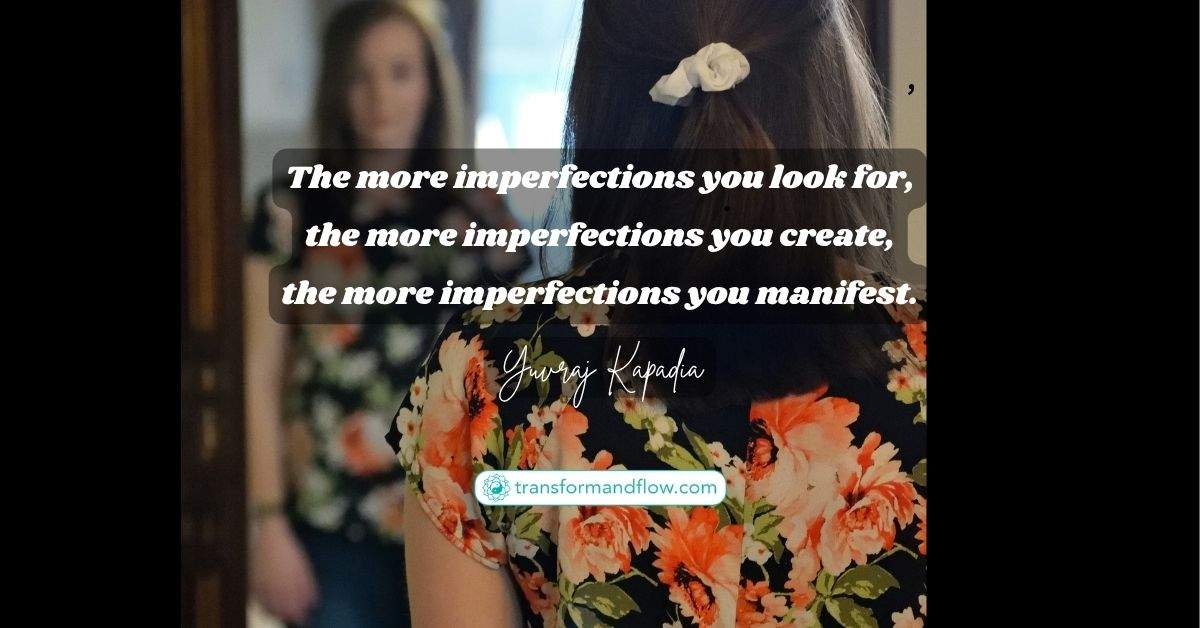The more imperfections you look for, the more imperfections you create, the more imperfections you manifest. Yuvraj Kapadia
Introduction
There’s a profound truth hidden within Yuvraj Kapadia’s words. It speaks directly to the way we perceive and shape our reality. Most of us are taught to strive for improvement, to notice flaws so we can correct them. While there’s value in growth, a subtle danger arises when we unconsciously become obsessed with what’s lacking, what’s broken, or what’s wrong.
When we constantly scan for imperfections, in ourselves, in others, or in our lives, we don’t just find them, we multiply them. This blog explores how our focus influences our experience, how the search for imperfection becomes a self-fulfilling prophecy, and how we can shift toward a healthier, more empowering perspective.
The Power of Focus
Have you ever bought a new car or learned a new word, and suddenly you start seeing that car or word everywhere? That’s your Reticular Activating System (RAS) at work. It’s the part of your brain that filters the information you pay attention to. It doesn’t create new things; it simply shows you more of what you’re already focused on.
The same applies to how we see our imperfections. When we focus on flaws in our appearance, performance, relationships, or environment, we start noticing more and more of them. Our RAS begins to highlight every wrinkle, every mistake, every perceived inadequacy. What started as a critical glance becomes a habitual lens, coloring our entire perception of reality.
And what happens when this becomes our default state of awareness? We start not only seeing imperfection everywhere but also expecting it. This expectation feeds our behavior, language, and decisions, which then manifests more of the same.
The Self-Fulfilling Prophecy of Negative Focus
Let’s break down Kapadia’s quote:
“The more imperfections you look for, the more imperfections you create, the more imperfections you manifest.”
1 You Look for Imperfections
Whether it’s low self-esteem, fear of failure, or a belief that the world is flawed, your perception becomes tinted with negativity. You start scanning people’s words, actions, or appearances for what’s “wrong.”
2 You Create Imperfections
This constant focus causes unnecessary friction in relationships, work, and within yourself. You might misinterpret neutral behavior as negative, or react critically and damage something that was never broken. The more you analyze, the more flaws you think you see.
3 You Manifest Imperfections
Eventually, your inner world becomes reflected in your outer world. Your experiences begin to validate your fears, not because they were objectively true, but because you’ve subconsciously influenced outcomes through biased attention, reactive decisions, and disempowered beliefs.
Perfection Is Not the Goal
The irony is that life isn’t meant to be perfect, and neither are we. Imperfection is what makes us human, relatable, and evolving. But our cultural obsession with flawless appearances and achievements often feeds the illusion that anything short of perfection is failure.
Instead of using imperfection as a tool for growth or authenticity, we often use it as a reason to criticize or withdraw. This mindset not only breeds dissatisfaction but stifles creativity, connection, and joy.
Shifting the Lens: What You Focus on Expands
Just as focusing on imperfections leads to more imperfection, shifting your attention to strengths, beauty, effort, or gratitude leads to more of those.
Here’s how to start shifting your lens:
1 Practice Gratitude Daily
Even on hard days, in the moments before you sleep, think of three things that went right or that you’re thankful for. Feel the emotion and ground it as a feeling in the body if you can. This rewires your RAS to notice what’s working.
2 Reframe the Negative
When you catch yourself criticizing, your looks, your work, or someone else etc., pause and ask: “What’s another way to look at this?”
3 Choose Compassion Over Criticism
Self-compassion is the antidote to internalized imperfection. The next time you make a mistake, respond as you would to a friend: with kindness and understanding.
4 Look for Growth, Not Flaws
Instead of “What’s wrong here?”, ask “What’s growing here?”, or “How has this improved me in some way?” Progress is often subtle but powerful.
Real-Life Example: The Mirror Effect
Imagine two people looking at the same garden. One sees weeds and wilted leaves. The other sees vibrant colors, buzzing bees, and promise. The garden hasn’t changed, only the focus has. Aside from the level of experience of life in the moment, the potential range of possibilities and outcomes is completely different for both.
Similarly, you can stand in front of a mirror and choose to see every line, blemish, and “flaw.” Or you can see a body that breathes, a face with stories, and eyes full of life. What you look for is what you experience.
When Imperfection Becomes Insight
This doesn’t mean we should ignore challenges or pretend things are perfect. Rather, it means we should use awareness as a tool for insight, not for judgment. Recognizing something is out of alignment is different from believing it is broken.
Approach imperfection not as a problem to fix, but as an invitation to grow, adapt, or deepen understanding. When we do this, imperfections stop being obstacles and start being stepping stones.
Closing Thoughts: Create What You Seek
Yuvraj Kapadia’s quote offers a powerful reminder that our minds are active participants in creating reality, not passive observers of it.
If you seek peace, look for peace. If you seek beauty, notice beauty. If you seek healing, focus on healing.
The lens through which you see the world becomes the world you see.
So ask yourself today – what are you looking for?
Because whatever it is, you’re likely creating more of it. Let it be something worthy of your attention.
Your focus is your frequency. What you dwell on, you dwell in.
Choose your lens with care, and build a life that reflects the peace, joy, and potential you want to live in.


